

Red Folder - The California State University. CSU faculty and staff are in a unique position to demonstrate compassion for CSU students in distress.
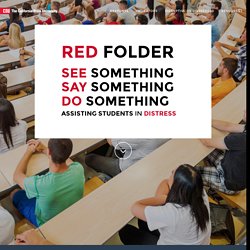
Both undergraduate and graduate students may feel alone, isolated, and even hopeless when faced with academic and life challenges. These feelings can easily disrupt academic performance and may lead to difficulties coping and other serious consequences. You may be the first person to SEE SOMETHING distressing in your students since you have frequent and prolonged contact with them.
The California State University, in collaboration with the California Mental Health Services Authority (CalMHSA), requests that you act with compassion when assisting students. In California, hope for student mental health care. California’s colleges and universities have made strides in providing mental health care to students—when higher ed as a whole has struggled to keep up with a growing demand for services.
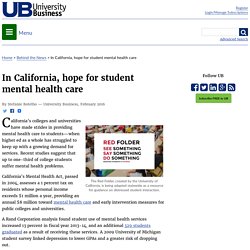
Recent studies suggest that up to one-third of college students suffer mental health problems. California’s Mental Health Act, passed in 2004, assesses a 1 percent tax on residents whose personal income exceeds $1 million a year, providing an annual $8 million toward mental health care and early intervention measures for public colleges and universities. Rev. James E. McDonald, C.S.C., Center for Student Well-Being // University of Notre Dame. Declining Student Resilience: A Serious Problem for Colleges. Education Dept. Seeks to Clarify Privacy of Students’ Medical Records - Government. By Katherine Mangan Student medical records should stay private with only a few, specific exceptions in cases where colleges that are sued need the information to defend themselves, according to draft guidance provided to colleges on Tuesday by the U.S.
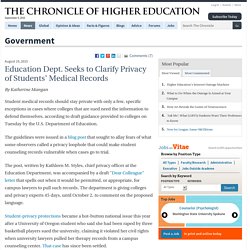
Department of Education. The guidelines were issued in a blog post that sought to allay fears of what some observers called a privacy loophole that could make student counseling records vulnerable when cases go to trial. The post, written by Kathleen M. Styles, chief privacy officer at the Education Department, was accompanied by a draft "Dear Colleague" letter that spells out when it would be permitted, or appropriate, for campus lawyers to pull such records. Students in Crisis: Mental Health & Suicide on College Campuses. Losing a son to suicide Please sign in to use this feature.

Yahoo Fireball Video Player Version : 5.350.0.1439599774 Page SpaceID : 1197747616 YVAP Acct. YVAP Play Context : default Current Media Platform OS : linux. Anxious Students Strain College Mental Health Centers - The New York Times. A Curriculum for the Selfie Generation - Faculty. By Dan Berrett Salem, Va.
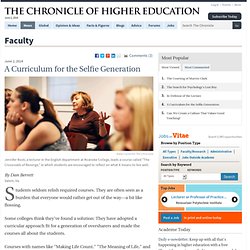
Students seldom relish required courses. They are often seen as a burden that everyone would rather get out of the way—a bit like flossing. Some colleges think they’ve found a solution: They have adopted a curricular approach fit for a generation of oversharers and made the courses all about the students. Courses with names like "Making Life Count," "The Meaning of Life," and "Concepts of the Self" appear in the pages of course catalogs, often as general-education or required offerings.
While the term originated in philosophy, it has popped up as the central theme of interdisciplinary humanities seminars, film-studies courses, and history classes at community colleges, small elite institutions, and large research universities. More me-centric courses are coming. The student-centric approach reflects recent curricular trends and scholarship. Age of Distraction: Why It’s Crucial for Students to Learn to Focus. Digital classroom tools like computers, tablets and smartphones offer exciting opportunities to deepen learning through creativity, collaboration and connection, but those very devices can also be distracting to students.
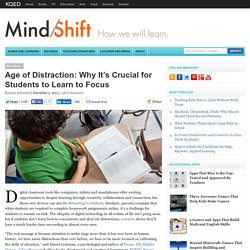
Similarly, parents complain that when students are required to complete homework assignments online, it’s a challenge for students to remain on task. The ubiquity of digital technology in all realms of life isn’t going away, but if students don’t learn how to concentrate and shut out distractions, research shows they’ll have a much harder time succeeding in almost every area. “The real message is because attention is under siege more than it has ever been in human history, we have more distractions than ever before, we have to be more focused on cultivating the skills of attention,” said Daniel Goleman, a psychologist and author of Focus: The Hidden Driver of Excellence and other books about social and emotional learning on KQED’s Forum program.
Who Gets to Graduate? In 1999, at the beginning of the fall semester, Laude combed through the records of every student in his freshman chemistry class and identified about 50 who possessed at least two of the “adversity indicators” common among students who failed the course in the past: low SATs, low family income, less-educated parents.

He invited them all to apply to a new program, which he would later give the august-sounding name the Texas Interdisciplinary Plan, or TIP. Students in TIP were placed in their own, smaller section of Chemistry 301, taught by Laude. But rather than dumb down the curriculum for them, Laude insisted that they master exactly the same challenging material as the students in his larger section. In fact, he scheduled his two sections back to back. “I taught my 500-student chemistry class, and then I walked upstairs and I taught this 50-student chemistry class,” Laude explained. Even Laude was surprised by how effectively TIP worked.
Photo. Meeting Suffering With Kindness: Effects of a Brief Self-Compassion Intervention for Female College Students - Smeets - 2014 - Journal of Clinical Psychology. Colleges Should Teach Religion to Their Students - Marshall Poe. When students feel adrift, spiritual guidance might help.
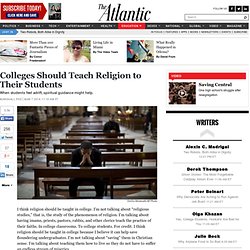
Emilio Morenatti/AP Photo I think religion should be taught in college. I’m not talking about “religious studies,” that is, the study of the phenomenon of religion. Texting while stressed: Implications for students’ burnout, sleep, and well-being. BTtoPWell-beingInitiative.